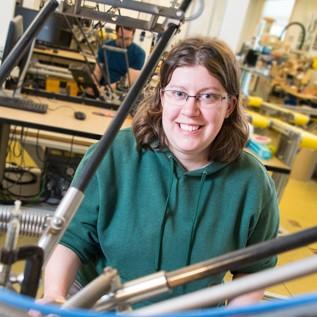Artificial intelligence (AI) robots have gained wide popularity in the last few years, becoming more common in everyday life. While some praise the benefits that these devices provide, others worry they may hold too much power. Jennifer Leaf, ARCS Oregon Scholar, will discuss these issues and more during ARCS 2019 All Members Conference (AMC) “New Frontiers in Robotics” Panel in Portland, Oregon this September.
“Robotics and automated systems are part of our everyday lives, but their capabilities, limitations, and ethical implications are not always well understood,” Leaf said. “I'm excited to serve on this panel, share what I know, and hear the current perspectives of other panelists and AMC attendees.”
As a second year PhD student, Leaf studies robotics at the College of Engineering at Oregon State University. She works directly with resilient robots, which are machines that can recover their original functions or fix themselves after partial damage. These robots are programmed to work in dynamic and unpredictable environments, often performing search and monitor assignments. By measuring a robot’s durability in these situations, Leaf can develop design principles that increase the robot’s adaptability rate, making it better suited for working in unknown environments.
“By analyzing robotic systems operating ability in new and diverse environments, we gain insight into how to increase their resilience, so they can accomplish an ever-growing range of tasks,” Leaf said.
As a child, Leaf first developed an interest in robots after watching the movie Short Circuit. However, it wasn’t until she received a Lego Mindstorms kit for Christmas after completing her master’s degree that she started working directly with them. These kits include a computer, parts, motors, and sensors that allow for the development of programmable robots. Leaf was hooked and shifted from computer science to robotics for her PhD focus. After establishing herself in this unique line of research, she was asked to speak on the “New Frontiers in Robotics” panel.
The panel discussion will focus on artificial intelligence and the ethical issues directly related to AI in today’s world. Other panelists include Dr. Cindy Grimm, associate professor in the School of Mechanical, Industrial, and Manufacturing Engineering at Oregon State University, Dr. Kagan Tumer, director, and Dr. Julie Adams, associate director for research at the Collaborative Robotics and Intelligent Systems (CoRIS) Institute at Oregon State University.
For more information about ARCS 2019 AMC click here.

